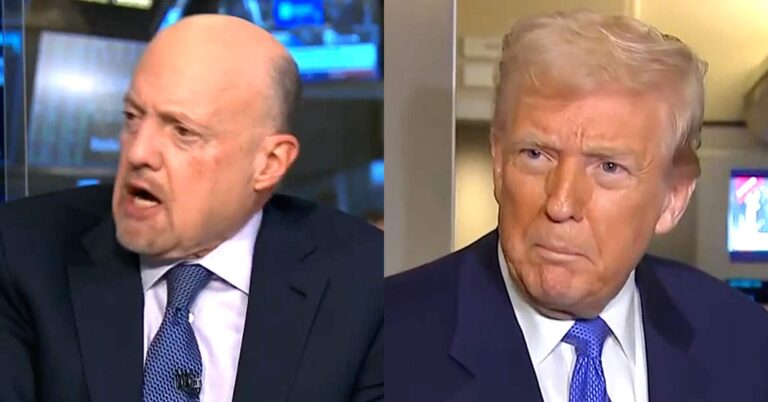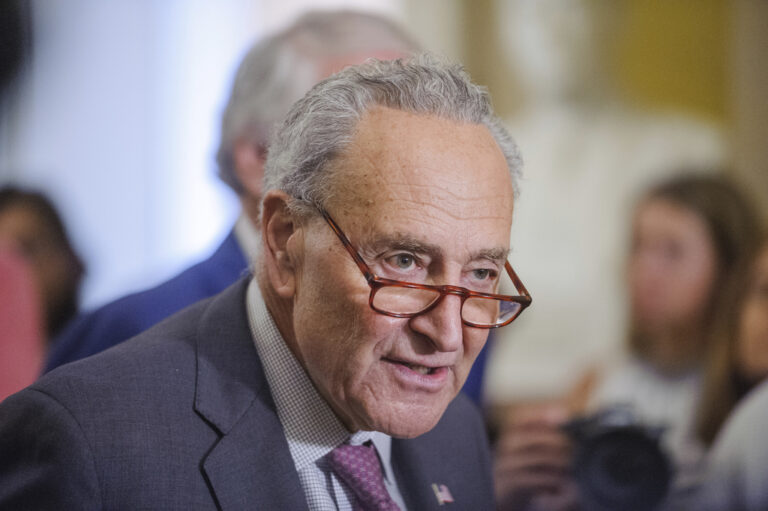 Washington – On Mother’s Day, Chuck Schumer delivered two commencement speeches upstate, flew back to Brooklyn to eat dinner with his wife, mother and daughters and at 7:38 p.m. toted a briefcase into his midtown office for the political ritual known as the Sunday press conference. Picking his way through a line of television cameramen, he joked: “It’s like football. No holes. Can’t get through,” then settled into his habitual spot between a lectern and a ratty blue curtain.
Washington – On Mother’s Day, Chuck Schumer delivered two commencement speeches upstate, flew back to Brooklyn to eat dinner with his wife, mother and daughters and at 7:38 p.m. toted a briefcase into his midtown office for the political ritual known as the Sunday press conference. Picking his way through a line of television cameramen, he joked: “It’s like football. No holes. Can’t get through,” then settled into his habitual spot between a lectern and a ratty blue curtain.
“The Times Square car bomb should be a wake-up call for the administration,” Schumer said into a bouquet of microphones, demanding that President Obama increase New York’s share of antiterrorism funding. “I’m going to pursue that legislatively.”
During his three-decade legislative career, Schumer, 59, has developed a reputation as a razor-elbowed, shamelessly self-serving, media-addicted political monster. He is also arguably the single most effective lawmaker of his generation.
Now, with confidant Senate Majority Leader Harry Reid (Nev.) hanging on to his seat by a thread, the Brooklynite is nearing the goal line of his long game. Succeeding Reid would make Schumer the highest-ranking Jewish elected official in American history and, more important for the uber-competitive politician, the first among peers. Schumer has thrust himself into the center of issues ranging from jobs to immigration to Supreme Court hearings, but as that momentum has carried him into a more intimate arena where popularity matters, the grating architect of the current Democratic majority has become noticeably more collegial. Perhaps not coincidentally, his colleagues see him as the front-runner to be their leader.
“It’s very much within the realm of possibility,” said Chris Dodd of Connecticut, who lost a race for minority leader to South Dakota’s Tom Daschle by a vote in 1994. “He’s always moving and always talking to people and he has a very good feel for what other people have to put up with. And that’s a critical point of that job, understanding the environment your colleague has to operate in.”
Schumer declined to be interviewed for this story and betrays an uncharacteristic loss for words whenever the term “majority leader” is uttered. Reid is, after all, still in control, and his closest competitor is Dick Durbin of Illinois, the liberal majority whip with whom Schumer has shared a Washington townhouse for years. Each can boast a strength: Durbin has the pleasant demeanor of a consensus builder; Schumer is the diehard fighter who has never lost an election. The prospect of a Chicago vs. New York majority leader race with echoes of Obama vs. Clinton is tantalizing, but also distracting.
Sen. Mark Begich (D-Alaska) said that the prospective race loomed over Schumer’s and Durbin’s floor chats with colleagues and said that when Schumer recently approached him about working together on technology or travel legislation, he took the New Yorker’s motives at face value. But he’s not naive: “Now maybe he wants me on board for other reasons.”
The White House is trying to appear neutral, with mixed results.
“The president has a record of working well with both,” White House press secretary Robert Gibbs said. “Obviously he has a longer, more personal relationship with Senator Durbin as a result of being home state colleagues and for his help getting him elected in 2004 and 2008.”
There is a sense within the White House that Durbin would be easier to work with, that Schumer would pose a problem on issues that could get him press back home, and that his Brooklyn bearing doesn’t exactly play between the coasts. Still, one senior administration official offered a separate assessment that the members of the Senate would opt for the independence ensured by having Schumer at the helm.
“Chuck Schumer is the next majority leader,” the senior administration official predicted. “He just works it.”
Crossing the aisle
The passage of March’s jobs bill revealed how Schumer operates. Reid, who was preoccupied with health care, delegated the jobs legislation out to North Dakota’s Byron Dorgan and Durbin. Durbin proposed his $80 billion package. A month later, after Republican Scott Brown (R-Mass.) had replaced Ted Kennedy and stripped the Democrats of their fillibuster-proof majority, Schumer persuaded Orrin Hatch (R-Utah) to sign on to a $13 billion jobs bill.
“He’s willing to cross over the aisle,” Hatch said. “Many of the others won’t.”
Max Baucus, the powerful finance committee chairman, sought to add his imprimatur to Schumer’s bill by attracting more Republican support with an extension of corporate tax cuts. But according to several sources with knowledge of the private negotiations, who would not speak on the record, Schumer surveyed Democratic members and sensed opposition to Baucus’s idea. On Wednesday, Feb. 10, as a furious blizzard paralyzed Washington and prevented staffers and senators from coming to work, Schumer reached Reid on his cellphone and made his case.
The next morning, Baucus announced his version of the bill, with the corporate tax breaks. The White House heralded it with a public endorsement. But Schumer had gotten to Reid, who shocked all of official Washington by ditching the Baucus bill for “a smaller package that has been talked about in the press.”
That smaller package was Schumer’s.
“Chuck is constantly at Harry’s ear,” one senior Democratic senator said when informed of the call. “So nothing would surprise me very much.”
A sense of purpose
In retrospect, everything in Schumer’s biography seems to have groomed him for such struggles.
The oldest son of Selma, a homemaker, and Abe, a pest exterminator, Charles Ellis Schumer was always an overwhelming force. According to Carol Kellermann, one of Schumer’s few personal friends and a former aide, everything needed to be for a purpose: “I don’t think he thinks there is much of a point to being self-reflective.”
Many of Schumer’s childhood accomplishments are now lore in his orbit. He correctly identified titanium dioxide as the pigment in white paint on a TV quiz show. He worked for Stanley Kaplan, the testing guru, and aced his SAT.
“It was a community where our parents in some cases had come from other countries, in almost all cases did not have a lot of money,” said Sen. Bernie Sanders (I-Vt.) who, like Schumer, former Minnesota senator Norm Coleman and Supreme Court Justice Ruth Bader Ginsberg graduated from James Madison High School in Brooklyn. “A strong education was enormously important.”
Schumer has said the sound through the floorboards of his father pacing on Sunday nights when he dreaded the coming workweek instilled in the son a desire to do something he would truly love. At Harvard, he developed a passion for politics and abandoned his intention to major in chemistry. He stayed in Cambridge to earn his law degree, then jumped right into a race for a seat in the New York State Assembly. At 23, he became the youngest member of the legislature since Teddy Roosevelt.
Lanky with bushy sideburns, Schumer joined the assembly’s basketball team, where he played guard alongside Sheldon Silver, now the powerful speaker of the assembly.
“We both come from a non-jumping background,” Silver said.
He made more of an impact on the chamber floor, and on Fridays accompanied another rising star, Jerrold Nadler, now a liberal lion in the New York congressional delegation, for the long drive back to the city from Albany. Once an older colleague joined them and complained about his tough primary.
“We dropped him off and Chuck said to me, ‘I don’t understand why he’s having such a hard time,’ ” Nadler recalled. “I said, ‘Chuck, holding a district is easy for you.’ He didn’t understand that things don’t come as easy to other people as they did for him. He understands that now.”
Schumer’s political power in Washington has always rested on the local pillars of voracious fundraising and manic courtship of the media, a cornerstone of which is the Sunday news conference. The idea is that exposure demonstrates hard work to voters and shows colleagues that collaboration will be rewarded with coverage in the New York-based national media.
“It may seem he has a pathological need for attention,” said one of more than a dozen former aides interviewed for this article. “But there is a method to the madness. He thinks it’s key to his survival.”
In 1980, at age 29, Schumer ran for Congress out of a vacant fruit store and decimated the competition. Newly married to Iris Weinshall, he set out alone for Washington, where he quickly learned the ways of moving legislation in the House.
“Chuck has this good bottom-line notion of the minimum it takes for the bill to be helpful,” said Anthony Weiner, who now represents Schumer’s old district in the House and who worked as an aide to Schumer. “He’s a half-a-loaf guy, because he understands that’s the art of legislating.”
David Yassky, a former aide who is now New York’s taxi and limousine commissioner, recalled how in 1992 Schumer navigated the House’s committees and applied media pressure to outfox the powerful Michigan Rep. John Dingell and pass a law requiring identification numbers on automobile parts. The bill was designed to prevent car thefts, but those serial numbers also provided the clue to detectives investigating the attempted Times Square bombing.
In the majority, Schumer accrued clout and an impressive legislative record. But when the House went Republican, the Hill climber in Schumer didn’t want to get mired in the minority. So in 1998, he zeroed in on the Senate seat of Republican Alfonse D’Amato, who was himself dubbed “Senator Pothole” for his emphasis on constituent services. Schumer held his maiden D.C. fundraiser for his Senate run in a townhouse on New Jersey Avenue. Only six people attended.
“It was a giant empty room, and I was like, ‘Jeez Louise,’ said Erick Mullen, who served as Schumer’s national finance director in 1998. “I was despondent about it, and at the end of it, Chuck grabbed a half-sandwich and said ‘Don’t be upset. This is going to be a long road.’
The election introduced a new Schumer breed of operative — press-savvy political wunderkinds like Josh Isay, Howard Wolfson and Sean Sweeney– who have since guided local, state and national candidates into office. From Schumer they all learned a common goal: to annihilate the competition.
“I underestimated the fact that he is not just another Democrat or Republican in office,” D’Amato said. “The Republicans are very fortunate that the administration does not listen to Schumer more, because he is smarter than that whole group in his little pinkie.”
Schumer’s campaign field organizer, Jay Carson, who went on to work as an aide to the Clintons and is now chief deputy mayor of Los Angeles, recalls filling in as Schumer’s driver one weekend and being coached by the campaign’s brass to drive aggressively. Schumer kept saying, “Late! Late! Late!” from the passenger seat, and Carson blew a red light to make up lost time.
“Yeah, I like that,” Carson fondly remembered Schumer growling.
His own man
Schumer often tells staffers that he is a senatorial mix of the brainy Daniel Patrick Moynihan and the hands-on D’Amato. But he is as much his own creation. As he toned down his signature advocacy for gun control, which had become politically poisonous, he chimed in on less partisan issues. He also glommed onto colleagues’ legislation or news conferences, a tacky scheme so common it became a verb, as when a colleague “got Schumered.”
What he lacked in decorum, he made up for in persistence.
One former staffer recalled that Schumer always carried a narrow white card in his jacket’s breast pocket: On one side was a call list covered with dozens of names and on the other, he had scrawled the senators he needed to nab.
“He’d buttonhole the senators,” recalled the staffer, who added that Schumer, upon making an agreement, would rush to the cloakroom, relay the news to his staff and instruct them to coordinate a news release with his counterpart’s aides, “before they could unwind it,” inking any deal at the moment of agreement.
Schumer’s shine dimmed under Hillary Clinton, who landed like a meteor in the Senate in 2001. Everything she uttered became a headline. Schumer’s aggression caused eye rolling in Hillaryland. And Schumer, according to one former staffer, considered Clinton opaque.
Even with Clinton dominating their shared Senate space, Schumer kept doing his own thing. As a junior member on judiciary, he took the unusual step of lobbying Justice Department staffers to get someone on their payroll to work for him. In May 2001, when a Republican defected and handed Democrats momentary control of the Senate, Schumer penned a manifesto for the confirming of judicial nominees arguing that the Senate should consider ideology in its assessment if the president had factored ideology into his pick. In 2004, Schumer returned to full campaign mode. He flew around the state in a single-engine plane, visiting every county at least twice, and captured 71 percent of the vote, the highest margin of victory for a statewide official in New York history. According to a well-known crack among veteran staffers, he lost only in Hamilton County, a sparsely populated Upstate area, because everyone there had the chance to meet him.
Throughout the race, Schumer flirted with the notion of running for governor. With reelection secured, he met with Reid, who had made clear that he wanted Schumer to head up the Democratic Senatorial Campaign Committee. According to former staffers, Schumer used the threat of leaving the Senate to angle for something more.
“It was brilliant,” recalled one former staffer. “He never even wanted to be governor.”
In exchange for staying on as chairman of the DSCC for the ’08 cycle, Schumer received the previously nonexistent “Vice Chairman of the Caucus” title, which gave him pull as the third-ranking Democrat in the leadership, under Reid and Durbin. As an unequivocal big shot, he started imparting the “Schumer method” to top candidates, which boiled down to create a blizzard of press, answer every attack within 24 hours, take strategic orders from Schumer and raise a whole lot of money.
Schumer, who now boasts an astonishing $21.8 million in his coffers, was never shy about dipping into one major donor pool inside his home state: Wall Street.
According to one attendee at a fundraiser for the DSCC during the 2006 cycle, he and Goldman Sachs CEO Lloyd Blankfein, another Brooklyn son who made good, entertained guests by performing nostalgic duets of furniture store jingles. “Chuck is the only political person I know who enjoys that part of the job,” said Silver.
His Republican rivals have taken notice of his modus operandi.
“I talked to him about it from time to time,” said John Cornyn, the GOP leader in charge of doing what Schumer did for his own party. The Texas Republican is, incidentally, trying to remove Reid. “He’s a machine. I think he appreciated that I took grudging admiration in his accomplishment and have tried to emulate him.”
As Schumer worked to win the majority, the national focus turned to the presidential race.
One staffer recalled having once tested Schumer about his interest in joining a national ticket. Schumer replied he had none, nor would anyone in their right mind select him as a vice president: he offered no obvious demographic or regional benefit. “I’d have a better chance of being president,” the staffer recalled Schumer saying. “Because if I had the time and desire, I would pay attention to Iowa, and I could figure it out.”
His stated candidate for 2008 presidential race was his fellow New York senator Clinton. But Clinton’s staff, populated as it was with Schumer alumni (Clinton once called his office “boot camp”) quickly understood that his heart was not in it.
“He was AWOL,” said one former senior official on the Clinton campaign. “We had a lot of surrogates who stuck their necks out for Hillary. And he wasn’t one of them.”
One former Obama campaign staffer found Schumer’s conversations with Clinton’s rival “surprisingly encouraging.”
Toward the end of the race, with Clinton fading, Schumer caused a shudder in the Clinton campaign every time he went on television. The fear, one former Clinton official said, was that Schumer, described as “totally self-absorbed,” would offer himself as a party healer and call for an end to the primary. Schumer’s defenders point to an April 2008 Fox News Sunday appearance alongside Durbin, Obama’s surrogate, in which the New Yorker spoke up for Clinton, saying “this race is a neck-and-neck race right now.”
The Obama administration, though, has often frustrated Schumer. Like his political doppelganger, Rahm Emanuel, who once harbored aims to be the first Jewish House speaker, Schumer favored a more incremental approach toward legislative priorities. The New York pragmatist preferred that Obama first tackle unemployment, energy, financial reform, education and withdrawal from Iraq before any mammoth health-care overhaul.
At a news conference last week, Schumer had a new gripe: He excoriated Obama’s White House and Clinton’s State Department for never adding the Pakistani Taliban to an official list of terrorist organizations. Reporters wanted to know why Schumer had become such a harsh critic of the administration, charging as he had that the Obama officials “just don’t get it” when it comes to protecting New York from terrorists. “I believe my job is to make my voice known,” he said.
Clinton’s departure from the Senate to become Obama’s secretary of state has finally made him the unchallenged leader of New York Democrats, but it has also forced Schumer into the uncomfortable position of party boss. He helped Caroline Kennedy in her failed attempt to replace Clinton as the state’s junior senator, participating in her tutorials, according to one source with knowledge of the sessions. When her prospective candidacy flamed out, Schumer then championed Kirsten Gillibrand, whose fundraising prowess he admired, and whose malleability offered him two votes in the Senate. When more senior Democrats threatened her chances, Schumer swatted them away and pushed the White House to protect her.
Gillibrand has been underwhelming in the Senate and is not exactly a campaign-talking point for Schumer’s potential majority leader candidacy, several Senate staffers said. But in the bigger picture of protecting the Democratic majority, Schumer has worked to ensure that both New York seats stay safe. Durbin, his potential opponent, faces the embarrassing prospect of watching Obama’s Senate seat fall into Republican hands.
Another local headache with bearing on Schumer’s majority leader prospects is his recent flare up with Mayor Michael Bloomberg. New York’s other powerbroker has criticized Schumer for staking out a more populist, and nationally palatable, opposition to his old Wall Street backers. According to one source close to Bloomberg, the billionaire mayor recently vented his frustration about Schumer to the Democratic senators who may soon be voting for a new leader.
‘Wine and cheese!’
No matter what, Schumer keeps working it.
On a recent afternoon, Schumer huddled on the Senate floor with Durbin and Reid. The Illinois whip brushed something off Reid’s right lapel. Schumer leaned in and nodded and then broke off to distribute a stack of flyers for a bipartisan senators-only gathering he had organized with colleague Lamar Alexander (R-Tenn.).
“Wine and cheese!” Schumer enthused, as he handed cards to Reid and Mark Warner (D-Va.), who some Senate senior staffers have mentioned as a dark horse in the majority leader race, to Barbara Boxer (D-Calif.), who is a close ally of Durbin.
Back in his messy midtown office on Mother’s Day, Schumer finished his prepared remarks and took some questions. Asked if his newly imposing stature in the Senate helped him advocate for more funding for New York, Schumer was quick to share credit.
“I have worked closely with my colleagues,” he said, “And on this area they have been very, very sympathetic to New York.”
(Source: Washington Post)











3 Responses
May we merit that the Republicans regain the majority in the senate this November.
If Schumer became the leader of the Senate, maybe the Republicans would attempt to run a serious candidate against him. It was hardly “ancient history” when New York regularly elected Republicans to state offices. I even remember when the Governor, both Senators, and both house of the legislature were Republican.
#1 During his three-decade legislative career, Schumer, 59, has developed a reputation as a razor-elbowed, shamelessly self-serving, media-addicted political monster. He is also arguably the single most effective lawmaker of his generation.
HE IS EFFECTIVE FOR EVERYONE EXCEPT FOR THE PEOPLE WHO HAVE ELECTED HIM.